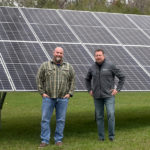As Sarah Chambers waited in a long queue under the baking summer sun with her two children to ride on Ferrari Land, she did not care much about the engineering behind one of Europe’s fastest rollercoasters.
“I just know it is very fast, that’s all I care about,” the British mother told i.
This was no understatement; Ferrari Land’s ride shoots terrified thrill seekers along at 112mph for five, gruelling, seconds, making it the star attraction at Portaventura World, Spain’s largest tourist resort.
People ride Red Force, the fastest vertical accelerator in Europe, during the opening day of Ferrari Land at Portaventura (Photo: Lluis Gene/AFP via Getty)
Very soon the ride and much of this huge entertainment complex, which is about 56 miles south of Barcelona, will be using the sun’s rays to send thousands of visitors careering along the tracks.
Portaventura World has won permission to build a huge solar power park, with 11,000 panels – roughly the size of nine football pitches. The €5m project, which will provide power for a third of the amusement park, will be running before Christmas.
Spain narrowly passed an unpopular law on Thursday to bring in energy saving measures to help Europe cope with winter shortages if Russia cuts gas supplies in retaliation for sanctions imposed because of the Ukraine war.
However, the solar revolution underway at Portaventura, which attracts 500,000 Britons on average every year, is typical of the way this tourism-dependent country is already turning to renewable power to drive this key industry.
As rollercoasters carrying hundreds of screaming revellers shot by, Choni Fernández, head of sustainability at Portaventura outlined how the entertainment park saw its future.
“This solar park is another example of our commitment to sustainability and decarbonisation. Portaventura World will take another step towards becoming a truly sustainable complex powered by energy autonomously,” she told i.
Huge solar energy parks have faced opposition from local residents in other parts of Spain but the Portaventura plan did not come up against this hurdle.
Tourists take pictures at PortAventura (Photo: Laia Solanellas/Europa Press via Getty Images)
Spain’s chain of 97 luxury state-run hotels, known as Paradores, were originally medieval castles, convents and ancestral homes before being converted to five-star hotels. Almost all are listed buildings.
Some date from the 10th century but are being converted to use 21st century renewable energy like solar panels.
“The problem is that we cannot alter how these buildings look because they are protected so we have to put these panels in places which do not alter their character,” José Miguel Moreno, sustainability director of Paradores, told i.
“We also want to replace gas oil boilers and use solar power as well as other forms of renewable energy to make all the paradores more sustainable as part of our plan for the future.”
Aside from solar panels, heat pumps have been installed in 32 hotels. Biomass energy is used in five establishments and thermic solar energy is in another 15 hotels. In all in 55 hotels, renewable energy is in use alongside traditional sources of power.
As electric cars become more popular, the Paradores network has installed recharging points in 25 hotels.
The objective is to use £12.65m (€15m) from European Union rescue funds to help rid 40 of these hotels of gas oil boilers by 2030. These boilers have been blamed for creating greenhouse gases.
The Spanish government’s energy saving bill passed after a knife-edge vote in parliament, bringing in measures ranging from limiting the air-conditioning to 27C and the heating to 19C to turning off lights in public buildings and shop windows.
Touted by the government as a way of showing solidarity with the rest of Europe, it has met stiff opposition in a country that does not depend on Russian gas and has suffered from a brutal heatwave and the worst drought for decades.
More on Spain
The drought, which started in January, has limited hydro-electric output so power plants have burned twice as much gas so far this month than a year ago, pushing Spain’s overall gas usage 4 per cent higher, according to data from gas grid operator Enagas.
Santiago Abascal, the leader of the far-right Vox party, is to challenge the bill in Spain’s constitutional court, claiming the measures challenge citizens’ “rights and liberties”.
The measures have proved confusing for some British tourists who believed that Spain had decided to turn off air-conditioning systems and threatened to cancel their holidays.
Tourism chiefs have attacked the government’s energy bill, suggesting it would damage an industry which was decimated by the pandemic.
Back at Portaventura, after surviving Ferrari Land’s Red Force ride, Ms Chambers was more than a little shaken. But after spending the day in 30C heat, she said it made sense using solar power to power the resort’s rides.
“I have been here twice before with the children. We love it. It is always boiling here so it seems to make sense to use some of that sun,” said Ms Chambers, a company director from Northumberland.





















Recent Comments